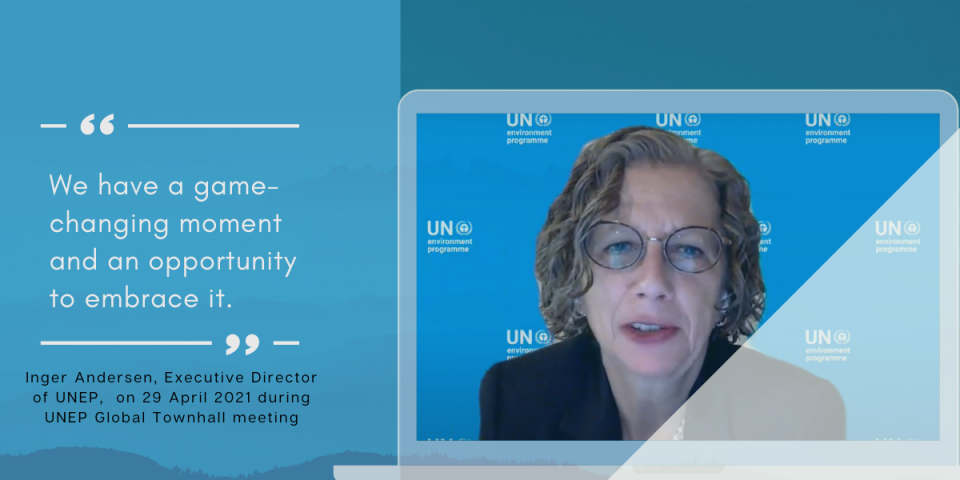UNEP celebrates the adoption of the SEEA EA and calls for its mainstreaming throughout the UN system

Following the historic adoption of the SEEA Ecosystem Accounting (SEEA EA) at the 52nd session of the UN Statistical Commission, Inger Anderson, Under-Secretary-General of the United Nations and Executive Director of the United Nations Environment Programme (UNEP) called for the mainstreaming of the SEEA EA throughout the UN system through the Environment Management Group[1] during a Townhall meeting held on 29 April 2021 dedicated exclusively to discussing the relevance of this new accounting framework in support of sustainable development policies.
The work of hundreds of scientists, economists, statisticians and accountants culminated with the adoption of the SEEA EA. The townhall stressed how the SEEA EA will change the way we measure wealth by putting natural capital on the same footing as manufactured capital and making the contribution of nature to the economy and well-being visible. In particular, the SEEA EA provides the statistical framework to measure the extent and condition of ecosystems as well as the ecosystem services they provide. The implementation of the SEEA EA in countries will be essential to mainstream nature in decision making.
Pushpam Kumar, Chief Environmental Economist and Senior Economic Advisor of UN Environment, remarked that UN Environment has been involved in the process of the development of the SEEA EA as a result of a long-standing partnership with UNSD. He praised the SEEA EA as the culmination of decades of work to provide a complementary measurement framework given the longstanding acknowledgement that metrics such as GDP do not capture all that human societies value. He noted key links of the SEEA EA to policy areas embedded in UNEP’s Medium-Term Strategy: promotion of nature-based solutions to climate change, investment in nature, tracking SDGs indicators, and measuring wealth in a manner which captures natural capital.
Salman Hussain, coordinator of The Economics of Ecosystems and Biodiversity (TEEB) programme of UNEP presented the results on the application of ecosystem accounting in South Africa as part of the Natural Capital Accounting and Valuation of Ecosystem Services project funded by the European Union and co-implemented with UNSD. He highlighted the policy application of accounts in evaluation of economic efficiency of land degradation and ecosystem restoration policies, placing the SEEA EA as crucial to the UN Decade of Ecosystem Restoration 2021-30.
Joy A. Kim, who is leading the green fiscal policy work in the Economy Division, observed how the SEEA EA complements and contributes to national budget planning by providing information of the monetary value of nature which could be used to embed environmental sustainability in budget allocation.
[1] The EMG was established for enhancing the United Nations system-wide inter-agency coordination related to specific issues in the field of environment and human settlements. Its role is to identify issues on the international environmental agenda that warrant cooperation, and finds ways of engaging its collective capacity in coherent management responses to those issues.
